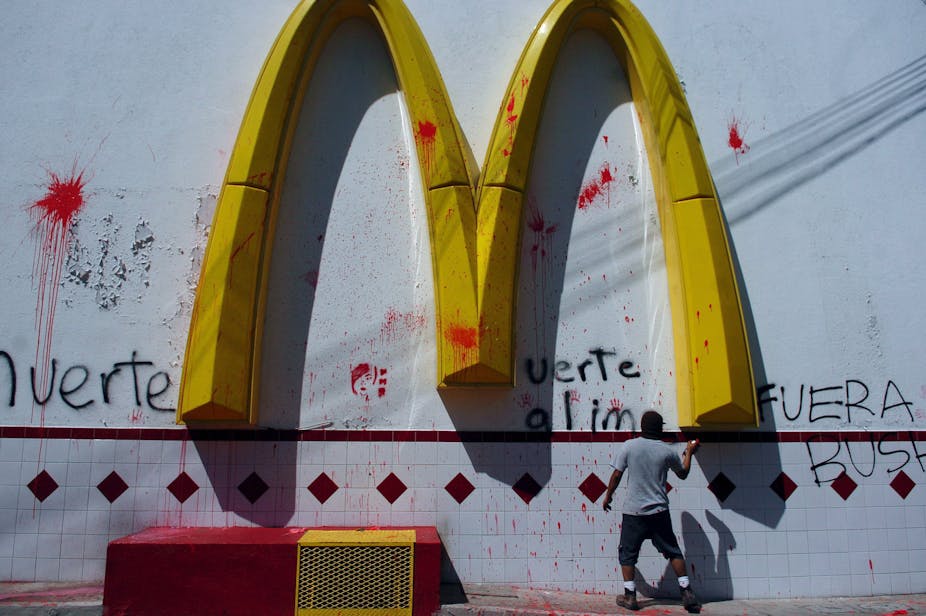David Cameron has told company bosses that firms should give their staff a pay rise. Certainly a raise in wages would be long overdue. The small average wage increase over the past year or so (1.8% between September and November 2014, compared with the same months a year earlier) has had no real impact on those at the bottom.
It seems very unlikely that most employers will heed the prime minister’s plea, however. Empty electioneering sound bites are one thing, but action is quite another. Trade union membership has declined in many countries since the 1980s and the ability of workers to unionise and pressure their employers to share the wealth of their profits has become more difficult. This is part of a wider global trend where wages as a share of GDP have been falling since the 1990s and income equality is rising.
Bucking the trend
Fast-food workers are trying to buck this trend. They are leading the charge against inequality and low wage jobs, with a series of co-ordinated strikes and demonstrations taking place in 190 cities around the world.
The Fast Food Forward movement started in the US more than two years ago. It has been campaigning for a $15 per hour minimum wage and trade union representation. Backed by the international service workers union, SEIU, US workers have already had some success. Seattle for example has agreed to phase in a $15 wage, while 34 US states are now considering raising their minimum wages. Union representation looks as far away as ever, but the campaign has gone global and there have been strikes in the UK, Brazil, Japan and elsewhere.

Those opposed to increasing the pay of lowest paid workers say they would be uneconomic and reduce job numbers. However, the opposite can be argued: low wages are bad for business, economy and society. If people are paid better wages then they have more to spend and can drive demand and grow the economy, producing better paid and more stable jobs.
In addition, higher wages should improve tax receipts. And, when wages are very low workers have to turn to the state for support – one study estimates that in the US the state spends US$3.8 billion a year supporting workers in the top ten US food chains; similar patterns are evident in the UK.
What they can get away with
The fact is that many big employers could afford to pay more. Last year for example McDonald’s made $5.5 billion in profits and gave $4.9 billion to its shareholders while wages for top executives have increased exponentially.
At the end of the 1990s top US McDonald’s management were receiving 250 to 300 times the wage of an ordinary hourly paid McDonald’s worker. Since then this ratio has more than doubled. The chief executive of McDonald’s, Don Thompson, earned $13.8m in 2012, well over 700 times more than a typical hourly-paid worker at McDonald’s in the US, who still only gets around $9 per hour (many younger workers earn even less). And in the UK the majority of workers receive just 1p or 2p above the minimum wage.
During the most recent round of protests, Thompson defended McDonald’s wage policy (and his own pay packet) by asserting the company pays “fair and competitive wages”. Perhaps Ray Kroc, the founder of the modern McDonald’s Corporation was more accurate when he stated:
We sold them a dream and paid them as little as possible.
What Thompson did not say was that McDonald’s pays far higher wages in Scandinavia. In Denmark for example, hourly-paid McDonald’s workers earn around US$21 per hour and enjoy other benefits. This is because Danish workers have union representation and a collective agreement. “Fair”, it seems, means “what we can get away with”.
Major struggle
The fast-food campaign for better wages and union representation seems to be gathering momentum, but it’s likely to be a major struggle. Free market economic policies, in place since the 1980s, have created hostile ground for unions and promoted “flexible” labour markets in a desperate attempt to produce more jobs (any kind of jobs). In the UK (and elsewhere) this has resulted in an increase in largely insecure, non-union, low-paid jobs, with union bashing as the norm and business interests dominating all other concerns.
There is no sign of a change to this pattern, despite the 2008 crisis and increasing criticism of existing neo-liberal policies such as Thomas Piketty’s book, Capital in the 21st century. Instead, the number of people working with zero-hours contracts continues to rise (one modest estimate putting it at 1.4m in the UK). Most of these jobs are at, or even below the minimum wage as workers may end up working hours for which they are not paid at all. Getting together to rally for change becomes very difficult in this situation.
While some European unions have had some success in organising fast-food workers, in the UK and the USA the employment law systems simply don’t give unions and workers a fighting chance. Although increasing the minimum wage would help, it’s a blunt instrument and won’t resolve many of the problems in low wage work based on insecure hours contracts. If David Cameron really wants to increase wages then he should give trade unions stronger recognition rights.

